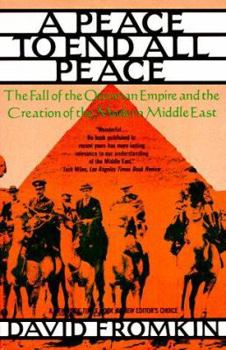A Peace to End All Peace: The Fall of the Ottoman Empire and the Creation of the Modern Middle East
Select Format
Select Condition 
Book Overview
Published with a new afterword from the author--the classic, bestselling account of how the modern Middle East was created The Middle East has long been a region of rival religions, ideologies,... This description may be from another edition of this product.
Format:Paperback
Language:English
ISBN:0380713004
ISBN13:9780380713004
Release Date:January 1990
Publisher:Quill
Length:635 Pages
Weight:1.15 lbs.
Dimensions:1.1" x 5.3" x 8.0"















